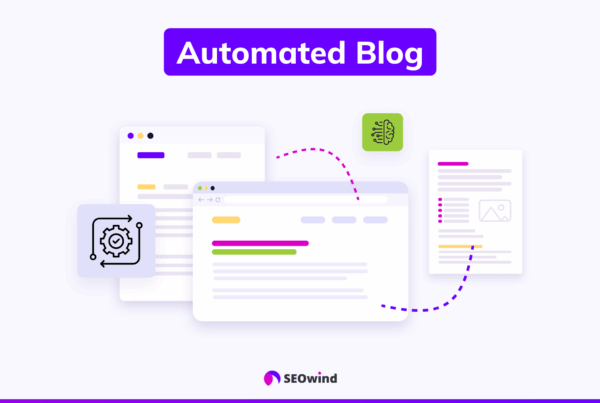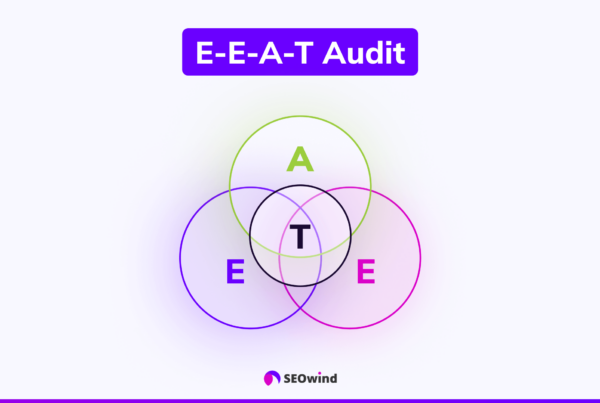Establishing yourself as an authority in your niche is like finding the Holy Grail of content marketing. But how do you know if you’re truly seen as an expert? That’s why we measure topical authority.
It’s not just about creating great content; it’s about knowing how it stacks up against the competition and resonates with your audience.
In this expert guide, I’ll walk you through the top methods to measure topical authority, giving you the tools to assess your standing and skyrocket your influence.
Key Techniques for Measuring Topical Authority

Measuring topical authority isn’t a one-size-fits-all process. It requires a multi-faceted approach that combines various techniques to give you a comprehensive view of your standing in your niche. Let’s explore some of the most effective methods to gauge your topical authority.
Analyzing Keyword Rankings and Overview
One fundamental way to measure topical authority is by analyzing your keyword rankings. This technique involves tracking how well your content ranks for specific keywords related to your niche. The higher you rank for a wide range of relevant keywords, the stronger your topical authority will be.
To get started, identify a set of core keywords that are central to your topic. Then, use tools like Google Search Console or third-party SEO platforms to track your rankings for these keywords over time. Pay attention to your rankings as well as the search volume and competition for these keywords. This will give you a clearer picture of your authority relative to the overall search landscape.
Topic Share Analysis
Topic share analysis is a more advanced technique that looks at how much of the conversation around a particular topic you’re dominating. This method goes beyond simple keyword rankings to assess your presence in a specific subject area.
To conduct a topic share analysis, you’ll need to use specialized tools to analyze large amounts of content across the web. These tools will help you determine what percentage of the content related to your topic comes from your site compared to your competitors. A higher topic share indicates stronger topical authority.
Content Depth and Comprehensiveness
The depth and comprehensiveness of your content play a crucial role in establishing topical authority. Search engines and users value content that thoroughly covers a topic, answering all potential questions and providing valuable insights.
To measure this aspect of topical authority, start by auditing your content. Look at factors like word count, the range of subtopics covered, and the inclusion of expert insights or data. Compare your content to top-ranking pages for your target keywords. Are you covering the topic as thoroughly as they are? Are there any gaps in your content that you need to fill?
Backlink Profile Analysis for Relevance and Quality
Backlinks remain a strong indicator of authority. However, when it comes to topical authority, quality and relevance are more valuable than quantity. Analyzing your backlink profile can provide valuable insights into how other websites in your niche perceive your expertise.
Use backlink analysis tools to examine the number of backlinks you have, their quality and topical relevance. Look for links from high-authority sites within your niche. These are strong signals that your content is valued by others in your field, boosting your topical authority.
Tracking Position with SERP Monitoring Tools (Ahrefs, SEMRush)
Search Engine Results Page (SERP) monitoring tools like Ahrefs and SEMRush are invaluable for tracking your position in search results over time. These tools allow you to see how your content performs for specific keywords and how your rankings change.
By consistently monitoring your SERP positions, you can identify trends in your topical authority. Are you steadily climbing the rankings for key terms in your niche? Are you maintaining top positions for important keywords? This data can help you understand how search engines evaluate your chosen topic expertise.
Leveraging Google Analytics for Insight on User Behavior and Content Performance
While external metrics are important, don’t overlook the wealth of information available in your Google Analytics account. User behavior on your site can indicate your topical authority.
Look at metrics like time on page, bounce rate, and pages per session for your topic-related content. High engagement rates suggest that users find your content valuable and authoritative. Also pay attention to which pages are driving the most organic traffic. These are likely the topics on which search engines consider you an authority.
Topical Authority Scores
Some SEO tools offer proprietary topical authority scores. These scores quantify your authority on a specific topic based on factors like content quality, backlinks, and user engagement.
While these scores can help you quickly assess your topical authority, it’s important to remember that they’re based on the tool’s algorithms. Use them as one piece of the puzzle rather than relying on them exclusively.
Expert Author Signals
Search engines increasingly look at content creators’ expertise when evaluating topical authority. This means that building a strong author profile contributes to your overall authority.
To measure this, look at factors like author bios, social media presence, and mentions or citations of your work across the web. Are you being recognized as an expert in your field? Are other authoritative sources referencing your content or insights?
Competitor Comparison
Finally, you should also understand how you compare to the competition. Conduct a thorough competitor analysis to see how your content, rankings, and engagement compare to those of others in your niche.
Look at factors like keyword overlap, content depth, backlink profiles, and social engagement. This comparison will give you a clearer picture of where you stand in your niche and where you might need to improve to boost your topical authority.
By combining these key techniques, you’ll gain a comprehensive understanding of your topical authority. Keep in mind that this process is not about excelling in just one area but building a strong foundation covering all these aspects. With this holistic approach, you’ll be well on your way to establishing and maintaining your position as a true authority in your field.

When it comes to topical authority SEO, understanding the right metrics to track is crucial. These statistics help gauge your progress and refine your SEO strategy for building topical authority.
Content Coverage
Content is the cornerstone of topical authority. To measure your content coverage, look at three primary aspects:
- Depth: How thoroughly do you cover each topic? Are you providing in-depth, expert-level information?
- Breadth: How wide is your coverage within your niche? Are you addressing all relevant subtopics?
- Freshness: How often do you update your content with new information?
For topical content, create comprehensive assets covering all subject aspects. Use tools like content gap analysis to identify areas where you can expand your coverage. Remember, topical authority SEO should be focused on creating a rich, interconnected web of high-quality content that demonstrates your expertise.
Search Engine Rankings
Your search engine rankings directly reflect how search engines perceive your topical authority. Monitor your rankings for key phrases in your niche. But don’t stop at the main keywords; look at long-tail variations, too. These can indicate the depth of your topical authority.
Pay special attention to featured snippets and “People Also Ask” boxes. Appearing in these prime positions is a strong signal of topical authority. It shows that search engines consider your content the best answer to users’ questions.
Traffic metrics
Traffic metrics give you insights into how users interact with your content. For topical authority, focus on:
- Organic traffic: Increasing organic traffic to your topical content suggests growing authority.
- Time on page: Longer time spent on your pages indicates that users find your content valuable and comprehensive.
- Bounce rate: A low bounce rate can suggest that your content is meeting user expectations and encouraging further exploration of your site.
These metrics help you understand if your content is not just ranking well but also satisfying user intent, which is a crucial factor in SEO topical authority.
Topic Share
Topic share is a more advanced metric that measures how much of the conversation around a topic you’re dominating. It’s about your visibility and prominence in your chosen niche. To measure topic share:
- Identify the main topics in your niche
- Analyze how often your content appears in search results for these topics compared to competitors
- Look at your share of voice in industry discussions, forums, and social media
A growing topic share indicates that you’re becoming a go-to source for information in your field, a clear sign of increasing topical authority.
Backlink Profile
Backlinks remain a crucial factor in SEO. But for topical authority, it’s not just about quantity. Analyze your backlink profile, focusing on:
- Relevance: Are the linking domains related to your niche?
- Quality: Are you getting links from authoritative sites in your industry?
- Anchor text: Does the anchor text reflect your topical focus?
A strong, relevant backlink profile indicates that other experts in your field recognize your topical authority.
User Engagement and Social Signals
User engagement and social signals provide valuable insights into how your audience perceives your topical authority. Monitor:
- Social shares: How often is your content being shared on social platforms?
- Comments: Are users engaging with your content through comments and discussions?
- Citations: Are other content creators referencing your work?
High engagement levels suggest that your audience values your content and considers you an authority in your niche. This reinforces your topical authority SEO and helps expand your reach and influence within your field.
Consistently tracking these key metrics provides a comprehensive understanding of your topical authority. Remember, building topical authority is an ongoing process. Use these metrics to guide your content strategy, identify areas for improvement, and establish yourself as the go-to expert in your niche.
How to Measure Topical Authority

Measuring topical authority is crucial for understanding your position in your niche and improving SEO authority. This shouldn’t be limited to having a high domain authority; make sure to demonstrate expertise on specific topics. Let’s explore three key areas to focus on when measuring your topical authority.
Content Quality
The cornerstone of topical authority is high-quality content. To measure the quality of your content, consider the following factors:
- Depth of coverage: Are you providing comprehensive information on your topic?
- Accuracy: Is your content factually correct and up-to-date?
- Uniqueness: Does your content offer fresh insights or perspectives?
- Readability: Is your content easy to understand and well-structured?
To assess these aspects, you can use content analysis tools that compare your assets to top-ranking pages. Look for gaps in your coverage and opportunities to enhance your content.
Another way to measure content quality is through user engagement metrics. High time-on-page and low bounce rates indicate that your content is valuable and comprehensive. These metrics suggest that users find your content authoritative and worth their time, which is a strong signal of topical authority.
Credibility of the Author
Author credibility plays a significant role in establishing topical authority. Search engines are increasingly considering the expertise of content creators when evaluating SEO authority. To measure author credibility, look at:
- Author bios: Are they comprehensive and highlight relevant expertise?
- Published works: Has the author been published in reputable industry publications?
- Speaking engagements: Is the author invited to speak at industry events?
- Credentials: Does the author have relevant qualifications or certifications?
You can also track mentions of the author across the web. Are they cited as an expert in other publications? Are they quoted in news articles related to their field? These external validations can significantly boost your perceived topical authority.
Consider implementing author schema markup on your website. This helps search engines understand who the author is and can enhance visibility into search results, further reinforcing your topical authority.
Audience Perception
Ultimately, topical authority is about how your audience perceives you. Measuring this can be more challenging, but it’s crucial for understanding your actual authority in your niche. Here are some ways to gauge audience perception:
- Social media engagement: Are people sharing and discussing your content?
- Comments and discussions: Do readers leave thoughtful comments or ask for your opinion on related topics?
- Backlinks: Are other websites in your niche linking to your content as a valuable resource?
- Brand mentions: Are you being discussed in industry forums or social media discussions?
Social listening tools track mentions of your brand or authors across the web. Pay attention to the context of these mentions. Are you being referred to as an expert or go-to source in your field?
Another valuable metric is the number of return visitors to your site. If people consistently return to your content for information, it’s a strong indicator that they view you as an authority in your niche.
Building topical authority is an ongoing process. It requires consistently producing high-quality, relevant content, establishing credibility, and engaging with your audience. By focusing on these areas and regularly measuring your progress, you can steadily increase your topical authority and, in turn, your overall SEO authority.
What is the Topical Authority Ratio?

Before we dive into examples, let’s clarify topical authority and how the Topical Authority Ratio fits into this concept. Topical authority refers to the level of expertise and trustworthiness a website or content creator has in a specific subject area. Meanwhile, the Topical Authority Ratio is a metric that helps quantify this expertise by comparing the number of high-quality, relevant pages related to a specific topic to the total number of pages on a website.
This ratio provides a numerical representation of how focused and authoritative a site is on a particular subject. A higher ratio indicates stronger topical authority. Let’s explore this concept through some practical examples.
Example A: Employee onboarding
Imagine a human resources consultancy firm that specializes in employee onboarding. Their website has 100 pages, with 80 dedicated to in-depth, high-quality content about employee onboarding processes, best practices, and case studies.
Topical Authority Ratio = 80/100 = 0.8 or 80%
This high ratio suggests that the consultancy has strong topical authority for employee onboarding. Their focused content strategy likely positions them as experts in this specific area of HR.
Example B: Promotional products
Consider an e-commerce site that sells a wide range of products but has a section dedicated to promotional items. Out of the site’s 1000 pages, 150 are high-quality content about promotional products, including buying guides, customization options, and case studies.
Topical Authority Ratio = 150/1000 = 0.15 or 15%
While the ratio is lower than in the first example, it still indicates a significant focus on promotional products. This could suggest that while the site isn’t exclusively about promotional items, they have developed a notable level of expertise in this area.
Example C: SEO
Let’s look at a digital marketing agency that offers various services but strongly focuses on SEO. Their website has 500 pages, 300 of which are high-quality, in-depth content about different aspects of SEO.
Topical Authority Ratio = 300/500 = 0.6 or 60%
This high ratio indicates that the agency has invested significantly in establishing its expertise in SEO. Such a focused approach contributes to their topical authority in this area of digital marketing.
Example D: Audience intelligence
Finally, consider a data analytics company that provides various data services but has recently started focusing on audience intelligence. Out of their 200 total pages, 40 are dedicated to high-quality content about audience intelligence techniques, tools, and case studies.
Topical Authority Ratio = 40/200 = 0.2 or 20%
While this ratio is lower than some of our other examples, it still shows a meaningful commitment to audience intelligence. As the company continues to develop content in this area, we’d expect to see this ratio increase, reflecting growing topical authority.
Understanding the Topical Authority Ratio helps assess your website’s focus and identify areas where you might want to develop more in-depth content. By strategically increasing your ratio in key areas, you can enhance your topical authority and improve your visibility in search results for those topics.

Measuring topical authority can be a complex task. Fortunately, there are several powerful tools available to help you assess and improve your standing in your niche. Let’s explore some of the most effective tools for measuring topical authority.
Ahrefs Keywords Explorer
Ahrefs is a powerhouse when it comes to SEO analysis, and its Keywords Explorer tool is particularly useful for measuring topical authority.
Here’s how to calculate the proxy to topical authority in Ahrefs:
- Take a head term like “content marketing” and enter it in Keywords Explorer
- Go to the Matching terms report and filter for a minimum volume of 10
- Export all keywords and reupload them into Keywords Explorer
- Go to Traffic share by domains
- Traffic share = topic share aka “topical authority”
With topical authority Ahrefs capabilities, you can:
- Identify keyword clusters related to your topic
- Analyze the difficulty of ranking for specific keywords
- Discover content gaps in your niche
By using this tool, you can understand which topics you’re already ranking for and where you have opportunities to expand your topical authority. Pay attention to the “Parent Topic” feature, which can help you identify broader themes within your niche.
Semrush Keyword Overview Tool
Semrush’s Keyword Overview Tool offers a comprehensive look at keywords and their performance.

It’s particularly useful for measuring topical authority because it provides:
- Keyword difficulty scores (including personal keyword difficulty)
- Related keywords and questions
- SERP feature analysis
Use this tool to identify the key topics in your niche and assess how well you’re covering them. The “Questions” section can be especially valuable for understanding what your audience wants to know about your topic.
Moz Domain Authority and Page Authority
While not specifically designed for topical authority, Moz’s Domain Authority (DA) and Page Authority (PA) metrics can provide insights into your overall SEO strength. When analyzing topical authority:
- Compare your DA to competitors in your niche
- Look at PA for your key topic pages
- Track changes in these metrics over time as you build your topical authority
Remember, while these metrics are useful, they should be considered alongside other, more topic-specific indicators.
Backlink Analysis Tools
Backlinks play a crucial role in establishing topical authority. Tools like Majestic, Moz, and Ahrefs offer in-depth backlink analysis. Use these tools to:
- Identify the topical relevance of your backlinks
- Analyze the authority of linking domains
- Compare your backlink profile to competitors in your niche
Pay special attention to links from high-authority sites within your topic area, as these can significantly boost your topical authority.
Content Analysis Tools
Content analysis tools like Clearscope and MarketMuse are invaluable for measuring and improving topical authority. These tools can help:
- Assess the comprehensiveness of your content
- Identify gaps in your topic coverage
- Compare your content to top-ranking pages
These tools ensure that your content thoroughly covers your chosen topics, which is essential for building topical authority.
When using these tools, remember that topical authority is about more than just keywords or backlinks. It’s about demonstrating comprehensive expertise in your niche. Use a combination of these tools to get a holistic view of your topical authority.
For instance, you might use Ahrefs Keywords Explorer to identify key topics, then use a content analysis tool to ensure your content comprehensively covers these topics. Follow up with backlink analysis to see how well your content is being recognized by others in your field.
When used effectively, these tools deliver valuable insights into your topical authority, identify areas for improvement, and develop a strategy to establish yourself as a true expert in your niche. Building topical authority is an ongoing process, so regular use of these tools can help you stay on top of your game and continuously improve your standing in your field.
Monitoring and Adapting Strategies for Sustained Topical Authority

Maintaining and growing your topical authority requires constant vigilance and adaptability. It’s not enough to establish authority once; you need to continuously monitor your performance and adjust your strategies to stay ahead. Let’s explore two crucial aspects of sustaining topical authority.
Using Data to Refine Content Strategy
Data is the lifeblood of effective authority SEO. By leveraging the correct data, you can fine-tune your content strategy to maintain and enhance your topical authority. Here’s how:
- Analyze user engagement metrics: Look at metrics like time on page, bounce rate, and pages per session. These can indicate how well your content resonates with your audience.
- Track keyword performance: Monitor how your content ranks for its target keywords. Are you maintaining or improving your positions? If not, it might be time to update or expand your content.
- Identify content gaps: Use tools to find topics within your niche that you haven’t covered yet. Filling these gaps can strengthen your overall topical authority.
- Assess content freshness: Regularly update your existing content with new information. Search engines favor fresh, up-to-date content when determining authority.
- Monitor backlink quality: Pay attention to the quality and relevance of sites linking to your content. High-quality, relevant backlinks can significantly boost your authority.
By consistently analyzing this data, you can identify trends, spot weaknesses, and uncover opportunities to enhance your content strategy. Remember, authority SEO is not a set-it-and-forget-it task. It requires ongoing refinement based on solid data insights.
Staying Updated with Search Engine Algorithm Changes
Search engines, particularly Google, frequently update their algorithms. These changes can significantly impact your authority strategies. To maintain topical authority, you need to stay informed and adapt quickly. Here’s how:
- Follow official search engine blogs: Google’s Search Central Blog, for instance, often announces major algorithm updates and provides guidance on best practices.
- Monitor SEO news sites: Websites like Search Engine Journal, Search Engine Land, and Moz regularly report on algorithm changes and their potential impacts.
- Join SEO communities: Participate in forums and social media groups where SEO professionals discuss recent changes and share insights.
- Watch your analytics closely: Sudden changes in traffic or rankings could indicate an algorithm update. Be prepared to investigate and adjust your strategies accordingly.
- Experiment and test: Don’t be afraid to try new SEO techniques, but always test them on a small scale before implementing them widely.
- Focus on user experience: While algorithms change, the core goal of providing value to users remains constant. Prioritizing user experience will help you weather most algorithm updates.
The key to sustaining topical authority in the face of algorithm changes is to focus on creating high-quality, valuable content for your audience. While optimizing for search engines is essential, never do so at the expense of the user experience.
By consistently refining your content strategy based on data and staying adaptable in the face of algorithm changes, you can maintain and grow your topical authority over time. This ongoing process of monitoring and adapting is crucial for long-term success in authority SEO. It ensures that you’re not just reacting to changes, but proactively positioning yourself as a lasting authority in your niche.


